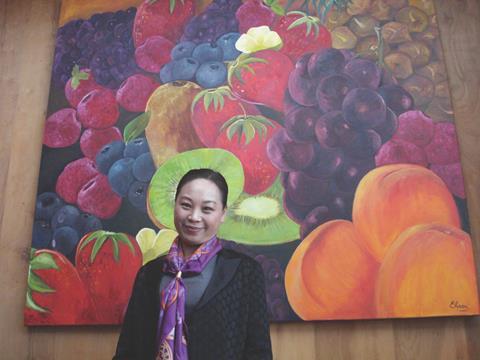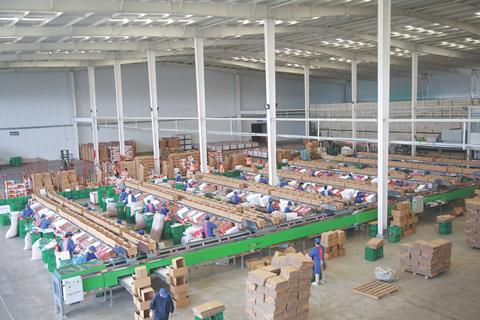Founder Liu Yan talks exclusively to Asiafruit about how the supplier can stay ahead of its competition and achieve global success
It has been five years since your last interview with Asiafruit. How has Xing Ye Yuan’s fresh fruit business grown over this period?
Liu Yan: As distribution channels continue to evolve, there has been much change and innovative expansion in China’s fruit industry over the past five years, and with that also came a reshuffling and elimination.
In the S2B2C (Supplier to Business to Consumer) field, our supply chain infrastructure maintains a relatively leading position in China: 14 fruit processing centres operating at full capacity in key production areas, and a reliable production base network across the country ensuring consistent supply.
On the 2C side, we have 12 fresh food logistics centres covering 186 hotspot cities, with smooth cooperation with supermarkets, e-tailers, and new retail businesses.
Four products have achieved billion-yuan (US$140m) status: cherries, apples, Babagan (Harumi mandarin), and durians. We’ve also made significant progress with our proprietary brands.
What is most exciting is our breakthrough in international business. The performance of our international expansion team has been satisfactory; we have successfully entered markets in Singapore, Indonesia, Thailand, Vietnam, Myanmar, and others.
As an emerging player from the Chinese fruit industry, the Xing Ye Yuan team is now competing alongside major global fruit brands. We are humbled by that, and will continue to make strides and capture new territories in the dynamic Asian region.

As you said, the way fruit is distributed and sold has changed since Covid. What is the change like internally for Xing Ye Yuan?
LY: Xing Ye Yuan started as a supplier to conventional retailers, but we didn’t stop there. As we continue to further deepen our engagement in brick-and-mortar retail, our collaboration with e-retailers and New Retail has become our primary source of growth.
We have implemented a strategy that simultaneously services both online and offline channels and advances both B2B and B2C segments. The Chinese market is a vast, multi-dimensional, diverse consumer ecosystem where various retail formats coexist. They do not replace each other but rather each has its own place in the market.
The downturn in China’s economy and weakening consumer purchasing power is a key focus for the global fruit industry. Do you think Chinese consumers are consuming less fruit, or are there new consumption trends emerging? Where can we find further growth?
LY: There is some downward pressure on fruit consumption in the China market, but the key change is not in the overall consumption volume but in the consumption structure. At first glance, the problem seems to lie on the demand side, but upon closer inspection, you can see it is still on the supply side.
Consumers’ enthusiasm for fresh fruit hasn’t diminished. Quite the opposite. Some new trends have emerged: self-care consumption has increased demand for healthy, organic, and/or low-sugar fruit products. The demand for convenient, small-pack fruit, fresh-cuts, and mixed fruit has significantly risen among young people, single households and small families.
Faced with new market requirements, if businesses remain focused on bulky and heavy ‘old products’ like large-size watermelons, basket-packed pears, and box-packed apples, their outlook will undoubtedly be difficult. We put Xing Ye Yuan on the right path by shifting focus to emerging categories like Shine Muscat grapes, cherries, blueberries, and persimmons.

Premium Chinese fruit has been performing well in export in recent years. How is Xing Ye Yuan’s export business tracking?
LY: Export has been the most valued business segment for Xing Ye Yuan recently, and has shown the most outstanding performance. We have a dedicated export expansion team consisting of young talents from Fortune 500 companies. We are focusing on the Asian region. We have successfully entered markets in Singapore, India, Thailand, Vietnam, and Myanmar.
We have laid a solid foundation in these markets with the traditional trio of Chinese fruit exports – apples, pears, and citrus – emphasising extreme cost-effectiveness. Simultaneously, we have introduced a new trio – Shine Muscat grapes, seedless pomegranates, and Orah mandarins, along with trial sales of blueberries and strawberries. We call them ‘Chinese New Fruit Three Plus Two’.
This interview is a shortened version taken from the July/August 2024 edition of Asiafruit. Pick up your copy at Asia Fruit Logistica



